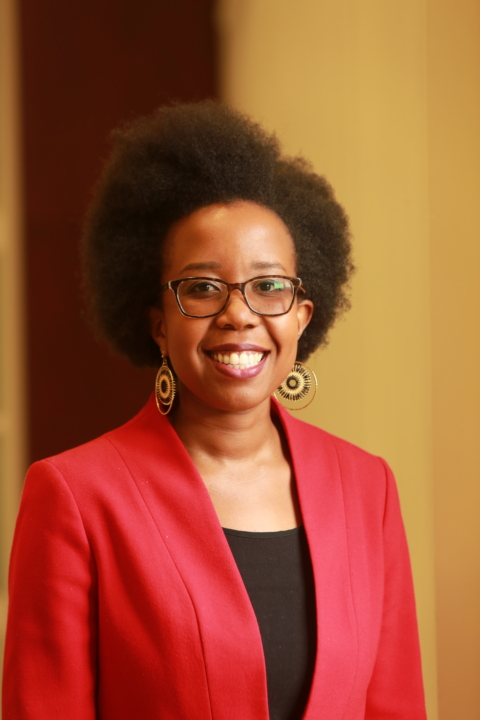Authorities have registered more than 65,000 Russian war crimes since it first invaded Ukraine nearly a year ago on Feb. 24. Ukraine Prosecutor General Andriy Kostin recently said those offenses include “indiscriminate shelling of civilians, willful killing, torture, conflict-related sexual violence, looting and forced displacement on a massive scale,” according to a CNBC report.
William & Mary Assistant Professor of Government and human rights advocate Kelebogile Zvobgo recently joined W&M News to discuss these war crimes and how they will be prosecuted. Zvobgo is the director of W&M’s International Justice Lab, which she founded in 2019 to conduct research on human rights, transitional justice and international law and courts.
The interview has been edited for length and clarity.
Q: How will these Russian war crimes in Ukraine be prosecuted?
A: Ukraine is already prosecuting war crimes and crimes against humanity in its own domestic courts. That’s the first way. When you apprehend enemy soldiers who you suspect have committed grave abuses, you can prosecute them through domestic courts. I also foresee atrocity crimes prosecutions in neighboring states and in Europe more generally through a doctrine known as universal jurisdiction. There are some crimes that are so heinous that any country can prosecute them. Let’s say an ex-Russian soldier finds themselves in Germany. Germany can prosecute that person for war crimes or crimes against humanity. It’s something that we saw early last year with a Syrian officer who oversaw torture and had made his way to Germany. Germany conducted successfully a prosecution based on universal jurisdiction. There’s also the International Criminal Court, which is investigating Russian abuses in Ukraine since 2014. But I think trials in Ukraine and trials in Europe, that’s where the bulk of international justice for atrocity crimes by Russian personnel are likely to happen.

Q: Will key leaders like Russian President Vladimir Putin be prosecuted?
A: These prosecutions are likely to target soldiers and even some officers more than they are likely to reach top generals and Russian leader Vladimir Putin, in part because international law requires that people be present for their trials. You must have people in custody, and that is the key challenge. If you step into Europe, the relevant domestic authority has jurisdiction through the universality principle, but for those who go back to Russia before they can be apprehended or who never leave Russia, assuming there is no regime change, and I don’t think that regime change is likely, then there will be no accountability for them.
Q: Of the 65,000 Russian war crimes that have been registered by authorities, how many will be prosecuted?
A: It’s always a small fraction, and that’s not just going to be true for Russia. It was true for apartheid crimes in South Africa; it was true for trials at Nuremberg for the Holocaust, for war crimes, crimes against humanity and crimes against peace. That was the jurisdiction at the tribunal in Nuremberg. I’m thinking of after the junta in Argentina, after all of these different conflicts, it’s only ever a fraction, but that doesn’t mean that it’s not powerful. It’s important symbolically to provide legal accountability. But legal accountability isn’t necessarily justice, right? There’s so much more that’s going to be needed, including the international community, I hope, helping to rebuild Ukraine’s infrastructure, helping to rebuild homes, helping to re-dignify people, helping to support their return should they choose to return to Ukraine from Poland and other border countries where they have fled. Upwards of seven million Ukrainians are refugees in Europe alone.
Q: Could you explain the process for prosecution in more detail?
A: In the case of the International Criminal Court, they would have to get someone into physical custody, and that would rely on cooperation with Member States and other interested parties. The U.S., for example, which is not a Member State, has actually helped previously with the arrest and transfer of fugitives of the court. That process takes a really long time, and it’s for each individual perpetrator. Also, there could be a special ad hoc tribunal, kind of like what we had through the United Nations with Security Council resolutions establishing tribunals for Rwanda and the ex-Yugoslavia. One of the challenges of rule of law is that you actually have to do it, every single time. Even if a perpetrator is clearly guilty, every perpetrator has to have due process and there has to be a high evidentiary standard that is met, and proper procedures have to be followed. Defendants have the right to an appeal, and that’ll take a long time, and it will only ever be partial. There’s no situation where you have legal accountability for all perpetrators, not for this scale of conflict.
Nathan Warters, Assistant Director of Media Relations

